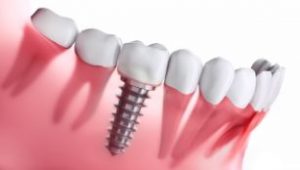 When it comes to getting a dental implant, the risk is low and the benefits are high. It’s a wonderful investment in your oral health that can last several decades or even a lifetime with proper maintenance. However, as with any surgery, no matter how minor, there’s always a small risk of infection. In this blog, you’ll find out how to prevent infection after getting dental implants in Mt. Holly. And, should one occur, you’ll also learn about the symptoms to watch for and how it can be treated. Keep reading to learn more!
When it comes to getting a dental implant, the risk is low and the benefits are high. It’s a wonderful investment in your oral health that can last several decades or even a lifetime with proper maintenance. However, as with any surgery, no matter how minor, there’s always a small risk of infection. In this blog, you’ll find out how to prevent infection after getting dental implants in Mt. Holly. And, should one occur, you’ll also learn about the symptoms to watch for and how it can be treated. Keep reading to learn more!
How Can You Prevent an Infection After Implant Surgery?
Fortunately, the chances of infection are quite low from the start. However, right from the beginning there are some things you can do to reduce the risk.
First, a dentist will begin by thoroughly reviewing your medical and dental history. Be sure to tell them about any and all health conditions and medications you’re taking as well as lifestyle choices such as smoking.
It’s important for them to know everything so they can make the best recommendations. Especially since some health conditions can interfere with healing, such as diabetes or immunity problems.
Here are some ways you can further reduce your risk of infection:
- Follow your post-operative instructions exactly.
- After the first two days, gently rinse your mouth out with salt water a few times a day. This is a safe, gentle and effective way to kill bacteria and promote healing.
- Stop smoking. The success rate for dental implants is around 98%, but it drops to 85% for smokers.
- Continue brushing thoroughly, but be gentle around the site of the implant. Some people are afraid of damaging the area by brushing, but you’re more likely to cause harm by not keeping things clean.
- For the first couple of weeks, primarily eat soft foods such as oatmeal, yogurt, soups, smoothies, cottage cheese, applesauce, mashed potatoes, bananas, etc. Avoid hard, crunchy, or tough foods during this time.
What Are the Symptoms of an Infection?
Here are some of the signs you may notice if an infection sets in:
- Red, tender, swollen or bleeding gum tissue (all signs of inflammation)
- A sensation that the implant is loose
- Moderate or severe pain or discomfort
- Difficulty chewing
- Receding gums around the implant
How Is an Infection Treated?
First, call a dentist right away to have your dental implants in Westampton evaluated if you notice any of the symptoms mentioned above. Catching problems as early as possible is important to minimize the risk of failure.
In many cases, an antibiotic can be used to successfully treat an infection. After a dentist assesses your implant, they’ll be able to make the best recommendation.
Dental implants are an outstanding tooth replacement option and an excellent long-term investment. It’s well worth it to give them the best chance of success from the very beginning!
About the Author
Dr. Adam Cygler is a general and restorative dentist and a graduate of the University of Colorado School of Dentistry. He has advanced training in oral surgery procedures and always educates his patients about how to care for their implants to minimize the chance of infection. If you have any other questions about dental implants in Mt. Holly, he can be reached via his website.
